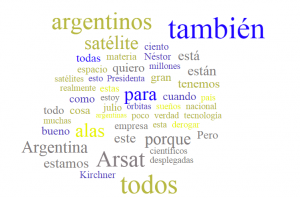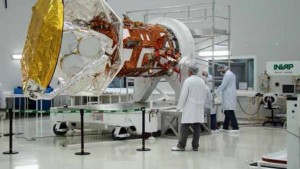EspañolWhile the international Ebola outbreak heightens fears around the world, a lethal infection has persisted in Argentina for decades. As in other parts of the world, it is now a true pandemic. But earlier this month, the Argentinean infection advanced beyond its terrestrial borders.
On Thursday, October 16, the Argentinean government launched a geostationary telecommunications satellite into space from French Guayana, and with it, nationalist rhetoric began anew here on Earth.
In a speech to celebrate the satellite’s launch, Argentinean president Cristina Kirchner took every opportunity to highlight the fact that the “satellite was built entirely from Argentinean technology, by Argentinean professionals.” Television and radio stations were required to transmit images of the launch of the Arianne 5 rocket. From beginning to end, the official broadcast was painted with a coat of nationalism.
“Along with the president of 40 million Argentineans, the entire country participates in the historic launch of the ArSat-1 satellite that furthers the effort of satellite sovereignty,” the commentator announced as the broadcast began. After the launch, Kirchner spoke via videoconference with the minister of federal planning, Juilo de Vido.
“I want to congratulate you; we are on the national broadcast,” the president told the only remaining member of the original Kirchner cabinet of 2003. “I would like to address all Argentineans, because we are very excited.” Kirchner used the “royal we,” a grammatical technique that monarchs and popes often use to present themselves as voices of the people.
During this nationalistic circus, a legislator from the province of Jujuy asked the president to name October 16 as the “Day of National Satellite Sovereignty.” As if Peronismo never ended, representative Eduardo López Salgado said: “One more time, from the hand of Peronismo, another momentous milestone for the benefit of all Argentineans has been achieved.”
The creativity used to propel this nationalist spirit is enviable. However, Kirchner’s declarations fell like a house of cards. According to an article published by El Pais, “ArSat-1 is not completely Argentinean, and Argentina was not the only country to participate in its development.” The article identifies European companies like Thales Alenia Space and the intergovernmental company Astrium, as the main suppliers of the technology used in the satellite.
National exaltation is a characteristic that is commonly seen in countries that have aligned themselves with 21st-century socialism. “Populism is a central tenant of nationalism, but when ranking problems, nationalism is in first place — in different forms — because nationalism adopts different forms,” Nobel laureate Mario Vargas Llosa explained in an interview with Viva.
Beyond the lies Kirchner offered in her speech, one can’t help but wonder what would have happened if the government of Argentina had attempted to launch a satellite into orbit using exclusively Argentinean technology.

The space mission began on October 1, when the satellite was transported to French Guayana using a Russian plane, and two weeks later it was put in orbit by a European rocket — details the president chose to omit in her epic struggle for autarky. What is usually considered a nightmare, is presented as a dream in Argentina.
These nationalistic tendencies have a clear objective: promulgating the idea that all Argentineans should be proud of a satellite made in Argentina. The speech was an effort to distract the population — at least for a few hours — from the symptoms of recession and the flood of government corruption scandals.
In essence, the declaration of satellite sovereignty is nothing more than the assertion that manufacturing a product entirely within the arbitrary borders of a single country is preferable to trade among individuals and nations. Although “made in” labels are arbitrary, protectionism — or economic nationalism — is one of the hallmarks of Kirchnerismo.
Contempt for division of labor is consistent with this worldview. Cristina and Néstor Kirchner’s chief philosopher and political scientist, Ernesto Laclau (1935-2014), argued that conflict was the force that mobilized society. On the contrary, the process that results from free markets “leads men to regard each other as comrades in a joint struggle for welfare, rather than as competitors in a struggle for existence,” wrote the economist Ludwig von Mises.
Conquer Space, Strengthen Poverty
A satelite financed by taxpayers is not exempt from symbolism. Rather than a sign of prosperity, the US$270 million needed to build the satellite represents the flippant manner in which countries manage tax revenue. If that money had never left the pockets of its legitimate owners, the taxpayers, the construction of the satellite would have been impossible.

This game of appearances is common practice for personalistic and authoritarian regimes. While the population of North Korea suffers from malnutrition, the Kim dynasty detonates nuclear weapons. The same happened in the Soviet Union during the Cold War, where the space race against the United States was a fundamental element of propaganda during the second half of the 20th century.
Governments also ignore the role of the private sector when constructing satellites. In 1974, the Westar 1 was the first US commercial satellite put into orbit by the logistics company Western Union in collaboration with NASA. Today, Space X, a company launched by serial entrepreneur Elon Musk, provides services that allow NASA to carry out unmanned missions to the International Space Station.
However, Kirchner continues playing with her new toys, promoting nationalist sentiment in the government’s parallel reality, as the economic crisis deepens in Argentina.
 Versión Español
Versión Español












